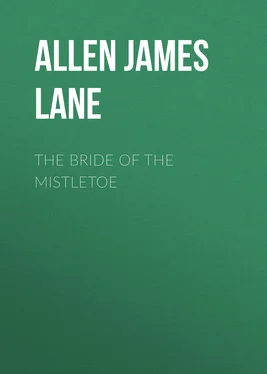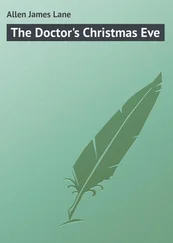James Allen - The Bride of the Mistletoe
Здесь есть возможность читать онлайн «James Allen - The Bride of the Mistletoe» — ознакомительный отрывок электронной книги совершенно бесплатно, а после прочтения отрывка купить полную версию. В некоторых случаях можно слушать аудио, скачать через торрент в формате fb2 и присутствует краткое содержание. Жанр: foreign_sf, foreign_antique, foreign_prose, на английском языке. Описание произведения, (предисловие) а так же отзывы посетителей доступны на портале библиотеки ЛибКат.
- Название:The Bride of the Mistletoe
- Автор:
- Жанр:
- Год:неизвестен
- ISBN:нет данных
- Рейтинг книги:4 / 5. Голосов: 1
-
Избранное:Добавить в избранное
- Отзывы:
-
Ваша оценка:
- 80
- 1
- 2
- 3
- 4
- 5
The Bride of the Mistletoe: краткое содержание, описание и аннотация
Предлагаем к чтению аннотацию, описание, краткое содержание или предисловие (зависит от того, что написал сам автор книги «The Bride of the Mistletoe»). Если вы не нашли необходимую информацию о книге — напишите в комментариях, мы постараемся отыскать её.
The Bride of the Mistletoe — читать онлайн ознакомительный отрывок
Ниже представлен текст книги, разбитый по страницам. Система сохранения места последней прочитанной страницы, позволяет с удобством читать онлайн бесплатно книгу «The Bride of the Mistletoe», без необходимости каждый раз заново искать на чём Вы остановились. Поставьте закладку, и сможете в любой момент перейти на страницу, на которой закончили чтение.
Интервал:
Закладка:
The carriage of her beautiful head, brave and buoyant, brought before you a vision of growing things in nature as they move towards their summer yet far away. There still was youth in the round white throat above the collar of green velvet—woodland green—darker than the green of the cloth she wore. You were glad she had chosen that color because she was going for a walk with him; and green would enchain the eye out on the sere ground and under the stripped trees. The flecklessness of her long gloves drew your thoughts to winter rather—to its one beauteous gift dropped from soiled clouds. A slender toque brought out the keenness in the oval of her face. From it rose one backward-sweeping feather of green shaded to coral at the tip; and there your fancy may have cared to see lingering the last radiance of whiter-sunset skies.
He kept his seat with his back to the manuscript from which he had repulsed her; and his eyes swept loyally over her as she waited. Though she could scarcely trust herself to speak, still less could she endure the silence. With her face turned toward the windows opening on the lawn, she stretched out her arm toward him and softly shook his hat at him.
“The sun sets—you remember how many minutes after four,” she said, with no other tone than that of quiet warning. “I marked the minutes in the almanac for you the other night after the children had gone to bed, so that you would not forget. You know how short the twilights are even when the day is clear. It is cloudy to-day and there will not be any twilight. The children said they would not be at home until after dark, but they may come sooner; it may be a trick. They have threatened to catch us this year in one way or another, and you know they must not do that—not this year! There must be one more Christmas with all its old ways—even if it must be without its old mysteries.”
He did not reply at once and then not relevantly:
“I heard you playing.”
He had dropped his head forward and was scowling at her from under his brows with a big Beethoven brooding scowl. She did not see, for she held her face averted.
The silence in the room again seemed charged, and there was greater constraint in her voice when it was next heard:
“I had to play; you need not have listened.”
“I had to listen; you played loud—”
“I did not know I was playing loud. I may have been trying to drown other sounds,” she admitted.
“What other sounds?” His voice unexpectedly became inquisitorial: it was a frank thrust into the unknown.
“Discords—possibly.”
“What discords?” His thrust became deeper.
She turned her head quickly and looked at him; a quiver passed across her lips and in her eyes there was noble anguish.
But nothing so arrests our speech when we are tempted to betray hidden trouble as to find ourselves face to face with a kind of burnished, radiant happiness. Sensitive eyes not more quickly close before a blaze of sunlight than the shadowy soul shuts her gates upon the advancing Figure of Joy.
It was the whole familiar picture of him now—triumphantly painted in the harmonies of life, masterfully toned to subdue its discords—that drove her back into herself. When she spoke next, she had regained the self-control which under his unexpected attack she had come near losing; and her words issued from behind the closed gates—as through a crevice of the closed gates:
“I was reading one of the new books that came the other day, the deep grave ones you sent for. It is written by a deep grave German, and it is worked out in the deep grave German way. The whole purpose of it is to show that any woman in the life of any man is merely—an Incident. She may be this to him, she may be that to him; for a briefer time, for a greater time; but all along and in the end, at bottom, she is to him—an Incident.”
He did not take his eyes from hers and his smile slowly broadened.
“Were those the discords?” he asked gently.
She did not reply.
He turned in his chair and looking over his shoulder at her, he raised his arm and drew the point of his pen across the backs of a stack of magazines on top of his desk.
“Here is a work,” he said, “not written by a German or by any other man, but by a woman whose race I do not know: here is a work the sole purpose of which is to prove that any man is merely an Incident in the life of any woman. He may be this to her, he may be that to her; for a briefer time, for a greater time; but all along and in the end, beneath everything else, he is to her—an Incident.”
He turned and confronted her, not without a gleam of humor in his eyes.
“That did not trouble me,” he said tenderly. “Those were not discords to me.”
Her eyes rested on his face with inscrutable searching. She made no comment.
His own face grew grave. After a moment of debate with himself as to whether he should be forced to do a thing he would rather not do, he turned in his chair and laid down his pen as though separating himself from his work. Then he said, in a tone that ended playfulness:
“Do I not understand? Have I not understood all the time? For a year now I have been shutting myself up at spare hours in this room and at this work—without any explanation to you. Such a thing never occurred before in our lives. You have shared everything. I have relied upon you and I have needed you, and you have never failed me. And this apparently has been your reward—to be rudely shut out at last. Now you come in and I tell you that the work is done—quite finished—without a word to you about it. Do I not understand?” he repeated. “Have I not understood all along? It is true; outwardly as regards this work you have been—the Incident.”
As he paused, she made a slight gesture with one hand as though she did not care for what he was saying and brushed away the fragile web of his words from before her eyes—eyes fixed on larger things lying clear before her in life’s distance.
He went quickly on with deepening emphasis:
“But, comrade of all these years, battler with me for life’s victories, did you think you were never to know? Did you believe I was never to explain? You had only one more day to wait! If patience, if faith, could only have lasted another twenty-four hours—until Christmas Eve!”
It was the first time for nearly a year that the sound of those words had been heard in that house. He bent earnestly over toward her; he leaned heavily forward with his hands on his knees and searched her features with loyal chiding.
“Has not Christmas Eve its mysteries?” he asked, “its secrets for you and me? Think of Christmas Eve for you and me! Remember!”
Slowly as in a windless woods on a winter day a smoke from a woodchopper’s smouldering fire will wander off and wind itself about the hidden life-buds of a young tree, muffling it while the atmosphere near by is clear, there now floated into the room to her the tender haze of old pledges and vows and of things unutterably sacred.
He noted the effect of his words and did not wait. He turned to his desk and, gathering up the sprigs of holly and cedar, began softly to cover her picture with them.
“Stay blinded and bewildered there,” he said, “until the hour comes when holly and cedar will speak: on Christmas Eve you will understand; you will then see whether in this work you have been—the Incident.”
Even while they had been talking the light of the short winter afternoon had perceptibly waned in the room.
She glanced through the windows at the darkening lawn; her eyes were tear-dimmed; to her it looked darker than it was. She held his hat up between her arms, making an arch for him to come and stand under.
“It is getting late,” she said in nearly the same tone of quiet warning with which she had spoken before. “There is no time to lose.”
Читать дальшеИнтервал:
Закладка:
Похожие книги на «The Bride of the Mistletoe»
Представляем Вашему вниманию похожие книги на «The Bride of the Mistletoe» списком для выбора. Мы отобрали схожую по названию и смыслу литературу в надежде предоставить читателям больше вариантов отыскать новые, интересные, ещё непрочитанные произведения.
Обсуждение, отзывы о книге «The Bride of the Mistletoe» и просто собственные мнения читателей. Оставьте ваши комментарии, напишите, что Вы думаете о произведении, его смысле или главных героях. Укажите что конкретно понравилось, а что нет, и почему Вы так считаете.












